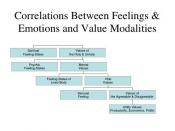Hoang Le Minh 12MRLV
Type 1: The validity and reliability of emotion as a WOK-is it the superior or inferior WOK?
To what extent can emotion be superior/preferable/more reliable as a way of knowing?
To what extent can emotion be an obstacle in the acquisition of knowledge?
To what extent can emotion distort other ways of knowing?
How true is the assertion that knowledge can be obtained independent of emotion?
To what extent is an emotional association necessary in the ownership of knowledge?
Type 2: The opposition between emotion and reason, their incompatibility
To what extent can reason and emotion be seen as rigid dichotomies?
Emotion is a state of feeling in response to a stimulus. How does emotion impact our knowledge?
To what extent can emotion be preferable and more reliable as a way of knowing?
The role of emotions from an epistemological standpoint has traditionally been overlooked, often considered to be irrelevant in the obtainment of knowledge.
Kant contends that "Emotions are entirely distinct from reason and rationality. They do not yield knowledge." This essay aims to consider whether or not emotion may actually be superior as a WOK in the pursuit of knowledge.
Emotions, particularly empathy in literature, are capable of providing us with a deeper understanding of the authorial intentions behind a literary work. One of my Literature exams contained an empathetic essay prompt, which required me to emulate a character's voice to demonstrate my understanding of the text. Many teachers and students presume that the task necessitates an emotional connection and knowledge of how a character would be feeling at a point in the story. It can be argued that readers who fail to engage with a text on an emotional level have not truly "known" the text, and thus, emotion is the preferable...


